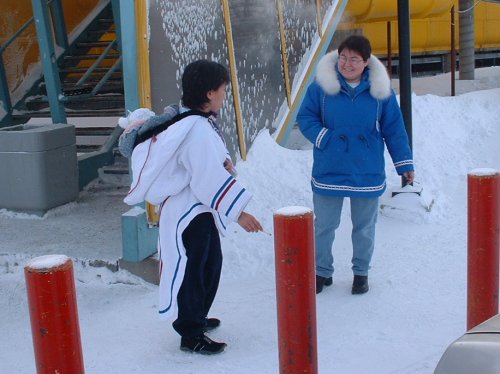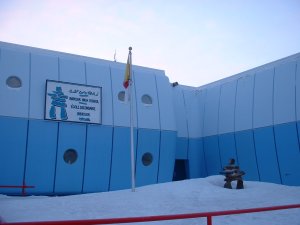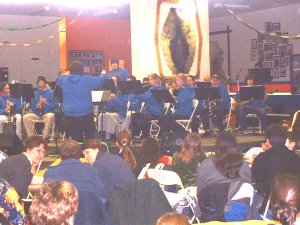
Inuit women, one with a baby, in traditional dress,
smoking outside the airport terminal, oblivious to the weather
Conclusion
How can I sum up two weeks in such an amazing place, so different from anywhere else I have ever been?
Firstly, I am very grateful that, as a doctor, I had the opportunity to come and work here, so that my flight and accomodation was provided by the Canadian taxpayers. (If you are a Canadian taxpayer, please accept my gratitude). Do not tell anyone at the Nunavut DHSS, but I would have seriously considered coming to work here for no pay, as long as my expenses were covered!
Secondly, the staff at the hospital were all very friendly and welcoming, especialy the guys who run the excellent cafeteria. That contributed a great deal to the experience.
Thirdly, the weather really was not that bad. As long as there is no wind, -25 C is really not a big deal. Although the days were short, with daylight roughly from 8:30 to 3:30, the Operating Room had a window, and I was usually finished work around lunchtime. I saw a lot more sun than I do in Toronto, where I leave work at 7:00 to spend the day in operating rooms without windows, and am often commuting home in the last of the winter daylight at 4:30pm.
It was strange treating the Inuit. Even when they spoke English, their manner is so quiet and reserved with the medical staff that it seems hard to get through. In Toronto, I rather resent having patients who live in Canada but do not speak English. In Nunavut, one has to accept that Inuktitut is the main official language, and in many ways I admire their efforts to keep their language and culture alive and strong.
The old Inuit ways are remarkable. It is almost beyond belief that people could have not only survived, but had a flourishing culture, in such a frigid area. Their skills in navigating, in hunting, and in merely staying warm, are amazing. But the old ways must have been incredibly hard, and the temptation to trade for metal goods and for weapons with the whalers was obviously too great to be resisted. Inuit have worked for white people for generations, as guides for whalers and arctic explorers, and as labourers on the construction of airports and satellite tracking stations. In return, they have been given trade goods, diseases, cigarettes, and alcohol, as well as schools, hospitals, houses and skidoos.

No-one can turn back the clock, and perhaps no-one would really want to.
At present 95% of the Nunavut government's income comes directly from the federal government. Could the Territory ever be self-sustaining? There are many problems, and a few opportunities. Tourism is one possibility, but a flight from Toronto to Pangnirtung, one of the most scenic spots on Baffin Island, costs about twice as much as a flight to anywhere in Europe, and roughly as much as a flight to New Zealand.

There are suggestions of mineral resources, such as oil and diamonds, but they would have to be very valuable to justify the cost of exploration and exploitation. There are some people bottling arctic water, especially from glaciers. The North West Passage is becoming an increasingly realistic shipping route, as the ice cap melts. The area retains some military importance, as a location from which North America can observe Russia and Europe.
The Inuit of Nunavut perform a very valuable service for the Government of Canada. By populating the area, however sparcely, with Canadian citizens, they assert Canadian sovereignty over almost two million square kilometres of land. It might cost a lot, per capita, to provide schools, healthcare, policing, subsidised fuel, transportation and other amenities over such a large area, but because there are only 30,000 people, the total cost is quite reasonable, especially in comparison with other government programs.
Where does that leave the Inuit? Are they to be just pawns in the game, or will they participate in making a future for themselves? It depends on the kids now in Inukshuk High School, and in other schools across Nunavut.


There are enormous possibilities for people who are bilingual in Inuktitut and English, who have some education, and who are willing to turn up to work on a regular basis. There are lots of jobs available at every level, from relatively unskilled workers in the hotels and construction sites, to work in traditional crafts and guiding, to skilled work for people with training in almost any field. There is no reason why the next generation of Nunavut pilots, lawyers, health care workers and police officers could not be mainly Inuit. Combinations of traditional Inuit ways and southern Candian methods may produce innovative solutions of international importance. For example, the no-party Government of Nunavut is an interesting approach to politics. Traditional methods of resolving disputes and dealing with crime may be quicker, more effective, more empowering to the victim, and more likely to make the criminal understand the consequences of his or her actions, than the adversarial approach of the usual North American legal system.
Unfortunately, this vision is unlikely to become a reality. Instead of working and gaining an education, 72% of kids drop out of high school, leaving only 28% to graduate. Smoking, drugs, alcohol, casual sex and hanging out seem more enticing than work of any kind, but this leads to a life of overcrowded subsidised housing, dependency on government handouts, and early death from violence, suicide or chronic illness brought on by an unhealthy lifestyle.
As to why that happens, and what can be done about it, unfortunately, I haven't a clue....